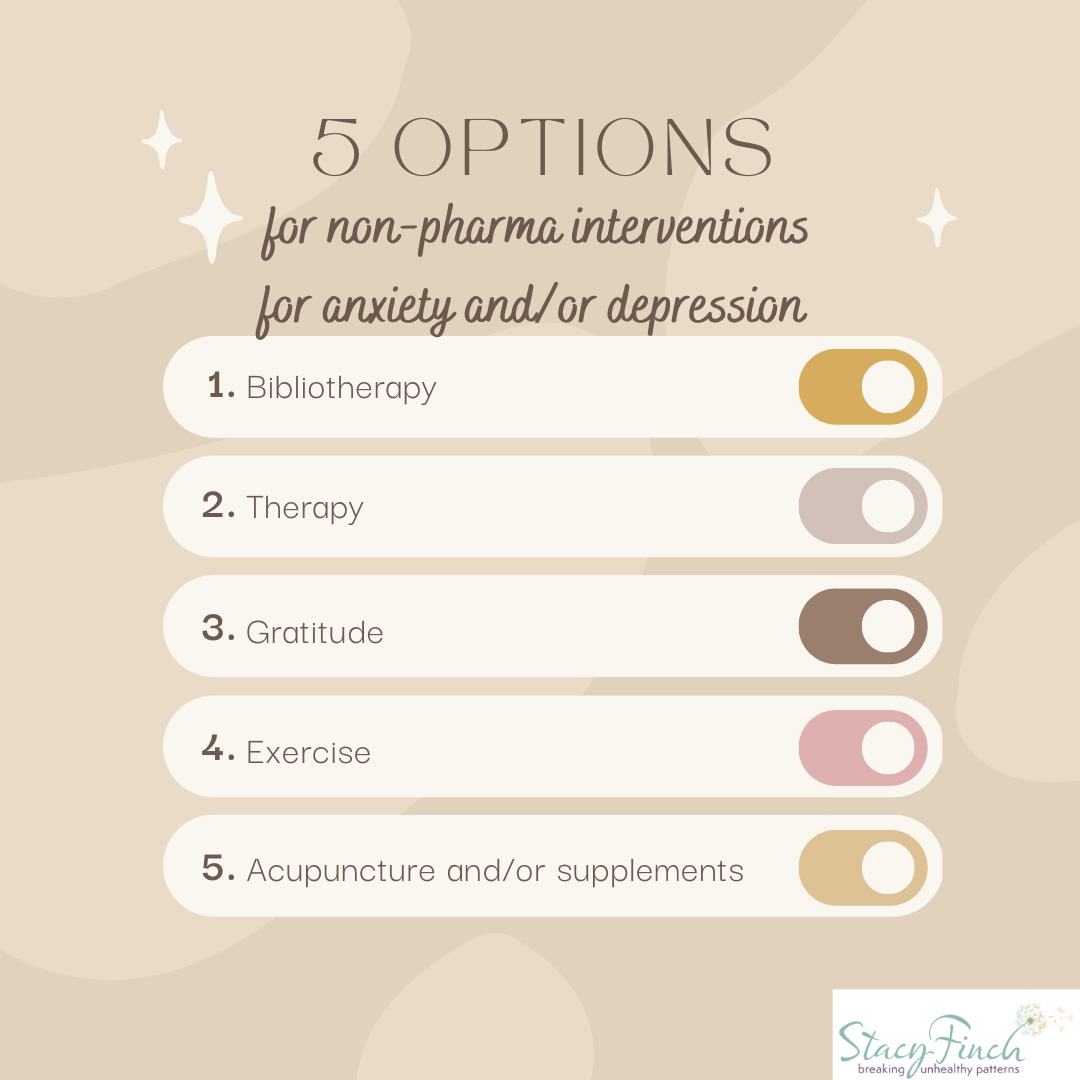Many people, for varied reasons, prefer not to use pharmaceuticals in the treatment of mental health issues. This article will look at non-pharmaceutical options, primarily for depression and anxiety.
The first article I came across was a meta-analysis looking at the effectiveness of bibliotherapy in the treatment of depression, anxiety, stress, and overall mental health. First to define a couple of terms. A meta-analysis gathers many different studies on the same topic and combines them. The term bibliotherapy means the use of reading in the treatment of mental health issues. This can be done instead of therapy or combined with therapy. The meta-analysis found that there were studies supporting the use of bibliotherapy, but there were also some studies that showed little benefit. However, none of the studies indicated any harm with bibliotherapy and outcomes were better than being on a waitlist for therapy.
CBT (cognitive behavioural therapy) and other evidence based psychotherapy can be more effective than medication for depression, even more severe forms of depression. If you haven’t tried therapy, schedule an appointment today. If you have tried therapy and did not get the results you wanted, try a new therapist. If you work with me, we will track your progress and make adjustments as needed until you find the relief you need.
If you’re struggling with depression and/or anxiety, you may want to start a gratitude practice. Expressing gratitude, whether through journaling or taking the time to express gratitude privately or in person, may help improve symptoms of depression and anxiety. Gratitude can also take the form of affirmations.
There has been a lot of research on the efficacy of exercise on one’s mental health. I have referenced one article below. Whatever type of activity you enjoy, do it. You will feel better and it will help with any mental health issue; depression, anxiety, stress, etc. If you’ve become bored with your exercise routine, try something new. If you need accountability, hire a coach or find a friend to work out with you. And an active lifestyle benefits your physical health as well.
There are safe alternative therapies that some studies show may help reduce symptoms of anxiety and depression. Although some studies do not validate the use, the risk of trying acupuncture is low and you may be someone who can find benefits from using the treatment. Possible supplements to use to alleviate anxiety and/or depression are vitamin D, passionflower, kava, St John’s Wort, valerian, magnesium, L-lysine, and L-arginine. (I referenced articles below, but am happy to write another post specifically on supplements and mental health).
So if you’re someone who has tried medication and has not found it helpful or have found it has too many side effects, or if you just don’t want to try medications, there may be other options for you to try. And if therapy is one of them, let’s schedule an appointment!
References
Driessen, E., & Hollon, S. D. (2010). Cognitive behavioral therapy for mood disorders: efficacy, moderators and mediators. The Psychiatric clinics of North America, 33(3), 537–555. https://doi.org/10.1016/j.psc.2010.04.005
Hoffmann, K., Emons, B., Brunnhuber, S., Karaca, S., & Juckel, G. (2019). The Role of Dietary Supplements in Depression and Anxiety – A Narrative Review. Pharmacopsychiatry, 52(6), 261–279. https://doi.org/10.1055/a-0942-1875
Lakhan, S.E., Vieira, K.F. Nutritional and herbal supplements for anxiety and anxiety-related disorders: systematic review. Nutr J 9, 42 (2010). https://doi.org/10.1186/1475-2891-9-42
Monroy-Fraustro, D., Maldonado-Castellanos, I., Aboites-Molina, M., Rodríguez, S., Sueiras, P., Altamirano-Bustamante, N. F., … & Altamirano-Bustamante, M. M. (2021). Bibliotherapy as a non-pharmaceutical intervention to enhance mental health in response to the COVID-19 pandemic: A mixed-methods systematic review and bioethical meta-analysis. Frontiers in public health, 9, 629872. https://doi.org/10.3389/fpubh.2021.629872 https://doi.org/10.3389/fpubh.2021.629872
Pelletier, L., Shanmugasegaram, S., Patten, S. B., & Demers, A. (2017). Self-management of mood and/or anxiety disorders through physical activity/exercise. Maladies Chroniques et Blessures Au Canada, 37(5), 149–159. https://doi.org/10.24095/hpcdp.37.5.03
Petrocchi, N., & Couyoumdjian, A. (2016). The impact of gratitude on depression and anxiety: the mediating role of criticizing, attacking, and reassuring the self. Self & Identity, 15(2), 191–205. https://doi.org/10.1080/15298868.2015.1095794
Zhang, Z.-J., Chen, H.-Y., Yip, K., Ng, R., & Wong, V. T. (2010). The effectiveness and safety of acupuncture therapy in depressive disorders: Systematic review and meta-analysis. Journal of Affective Disorders, 124(1/2), 9–21. https://doi.org/10.1016/j.jad.2009.07.005


0 Comments